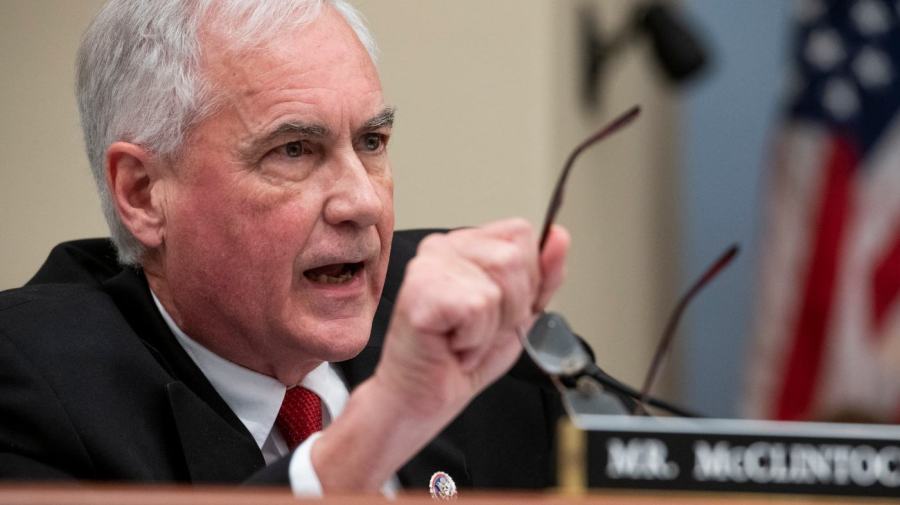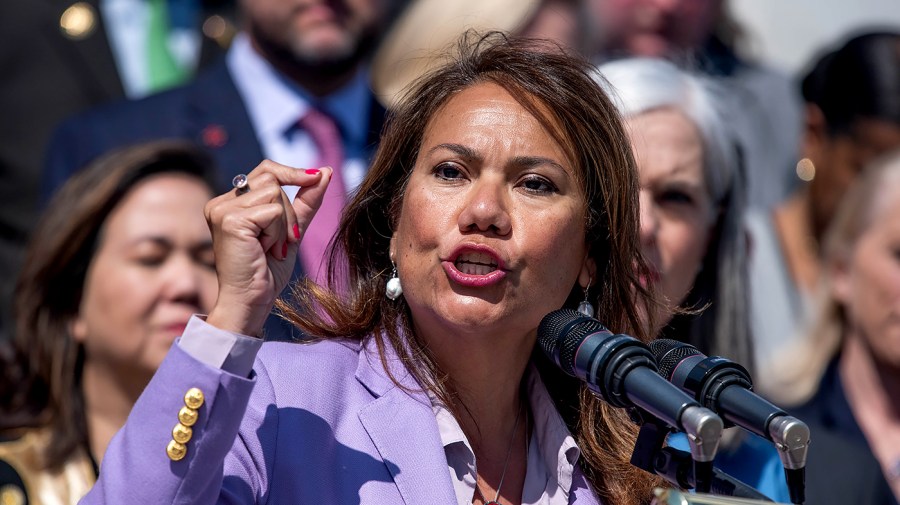House Republicans pass border bill limiting asylum protections
House Republicans on Thursday passed their long-promised border crackdown, voting to finish former President Trump’s border wall and severely restrict access to asylum the same day President Biden is set to lift the use of Title 42.
H.R. 2 — originally designed to be one of the first major pieces of legislation passed under the new Republican majority — was approved with a 219-213 vote, a day after wrangling over relatively minor sections of the bill briefly delayed its advancement.
Beyond building the wall, the legislation greatly increases the hiring of border agents and seeks to bar them from doing any “processing” of migrants, language Democrats said would prevent officers from doing basic tasks.
But its most significant provisions slice away at asylum rights for those fleeing persecution and other pathways to come to the U.S., measures immigration advocates described as among the most extreme provisions to be seriously considered by the House in recent years.
“This is the largest human trafficking crisis I have ever witnessed in my lifetime, and it’s time for Congress to act and restore control to this uncontrolled border,” said House Foreign Affairs Chairman Michael McCaul (R-Texas), a sponsor of the bill.

Rep. Michael McCaul, R-Texas, speaks during a Republican news conference ahead of the State of the Union, March 1, 2022, on Capitol Hill in Washington. (AP Photo/Jacquelyn Martin, File)
He pointed to numerous Trump policies included in the bill, calling them “proven solution[s] to reduce the chaos.”
The bill stands little chance of becoming law because it is likely to face opposition in the Democratic-controlled Senate and the White House. But it showcases the House GOP’s priorities in responding to immigration and the border.
Democrats during the debate sought to highlight provisions they say are problematic, arguing many of the bill’s measures were so broad or poorly written they would exclude many deserving of protection and create unintended consequences.
“My Republican colleagues are trying to take us back to the failed, illegal, and immoral policies of the Trump administration. Former President Trump’s radical, inhumane, and racist immigration actions weakened the U.S. economy, undermined our moral standing in the world, and did not make us any safer,” said Rep. Jerry Nadler (D-N.Y.), the top Democrat on the Judiciary Committee.
“While trampling on some of our most deeply held American values, his approach also failed to stem the flow of migrants across our border. Let’s be very clear about what this legislation would do. When taken together, this bill serves as a wholesale ban on asylum.”
The bill includes numerous Trump-era priorities, including a requirement to detain all migrants or return them to Mexico if they cannot be returned by their home country. It also includes a provision that would block anyone who tries to seek asylum at the border if they didn’t first apply and get denied at another country along their journey.
That provision alone would block groups important to key Republican constituencies, like Cubans, from seeking asylum in the U.S. because they would be unlikely to be able to fly directly to the U.S. to make the claim.
Rep. Tom McClintock (R-Calif.) said the provisions are needed because some migrants are “cutting in front of the line.”
“Asylum is not an open invitation to bumrush our borders,” he said.
“Yes, we are a nation of immigrants. We are also a nation of laws.”

Rep. Tom McClintock (R-CA) questions Office of Management and Budget Director Shalanda Young during a House Committee on the Budget hearing in the Canon House Office Building on March 29, 2022 in Washington, DC. (Photo by Rod Lamkey – Pool/Getty Images)
Republicans have long viewed asylum as a backdoor to the U.S. because it takes years for claims to be processed in immigration court, where denials come with an order to leave the country.
Rep. Mike Johnson (R-La.) called asylum “a testament to America’s history as a beacon of hope, freedom of opportunity.” But he blamed Democrats and other groups for creating a system that encourages migrants to make dangerous journeys that could cost them their lives.
“Unfortunately, drug cartels and activist judges and the open borders lobby and the radical administrations have worked in tandem to undermine that system, to undermine the integrity of the U.S. immigration system itself and weakened protections for those truly seeking a safe haven from persecution by forcing them in a long line at the immigration court,” he said.
“Being pro-immigrant and supporting humanitarian values does not mean maintaining the dangerous status quo.”
Some Democrats pointed to comments from Rep. Tony Gonzales (R-Texas) who opposed an earlier version of the bill, calling it “un-Christian.”
“For decades, congressional Republicans have blocked efforts to update immigration laws, choosing to focus only on the border, believing if we can only be cruel enough, that will deter desperate people seeking asylum at our nation’s front door. That hasn’t worked,” Rep. Veronica Escobar (D-Texas) said.
“The cruelty, unfortunately, is the point. It’s no wonder that this bill has been called un-Christian.”
One provision would bar groups like the Red Cross and other aid organizations from providing assistance to migrants. On that front, Republican lawmakers heeded warnings from Democrats, who said the original language would have prohibited nonprofits from offering any service to any migrant regardless of their immigration status, forcing hospitals to check documents before offering medical care.

Rep. Veronica Escobar (D-Texas) speaks during a press event on ending gun violence outside the Capitol in Washington, D.C. on Wednesday, March 29, 2023.
While that provision has since been limited to bar federal funding for organizations that “facilitate transportation, lodging, or immigration legal services to inadmissible aliens,” Democrats say the bill now technically bars paying the government contractors that transport migrants to and from facilities as they are nongovernmental organizations.
“This language would prevent ICE from contracting with private companies to facilitate deportations or provide detention space because those companies are nongovernmental organizations. Yes, you heard that right, this bill is so poorly written that it could actually prevent ICE from deporting people,” Rep. Bennie Thompson (D-Miss.) said in remarks on the bill on Wednesday.
Thursday’s bill passage was nearly derailed by disagreement between Republicans on two provisions of the bill, one dealing with whether to study labeling cartels as foreign terrorist organizations, and another that mandates E-Verify, a system used to check whether someone is authorized to work in the U.S.
A last-minute amendment Wednesday sought to soften those issues, removing the word terrorist from the study — now the responsibility of Congress over the Department of Homeland Security — and adding language forcing DHS to consider the impact on food security if the ag sector is forced to use E-Verify.
But Thursday’s debate was a chance for Republicans to highlight the end of Title 42, scheduling the bill’s passage to coincide with the fall of the Trump-era policy widely used by Biden that allows for the rapid expulsion of immigrants without letting them seek asylum.
“In just a few hours, the Biden administration will end the enforcement of Title 42. This administration estimates that we could see 13,000 immigrant encounters per day at the border. So clearly allowing 42 to end with no plans to secure our border is not only negligent, but it severely jeopardizes the national security interests of our country,” Rep. Mario Diaz-Balart (R-Fla.) said.
But Rep. Lou Correa (D-Calif.) noted that many Republicans pushed to end the underlying public health emergency underlying the immigration tool.
“My friends on the other side are absolutely correct — Title 42 is ending today. But I have to remind you, when the many of you voted to lift the COVID-19 emergency, you legally effectively voted to end Title 42. Don’t forget that. You voted to lift Title 42,” he said.
Department of Homeland Security Secretary Alejandro Mayorkas on Thursday laid out plans to respond to the end of Title 42, highlighting the difficulty in managing the border because Congress has not passed comprehensive immigration reform.
“Our current situation is the outcome of Congress leaving a broken, outdated immigration system in place for over two decades, despite unanimous agreement that we desperately need legislative reform. It is also the result of Congress’s decision not to provide us with the resources we need and that we requested,” Mayorkas said at the White House press briefing.
McCaul nodded to that request in his own pitch for the bill.
“Secretary Mayorkas, you asked for a bill,” he said. “Here it is.”
Copyright 2023 Nexstar Media Inc. All rights reserved. This material may not be published, broadcast, rewritten, or redistributed. Regular the hill posts







